上海牛津英语6A Module 2 Unit4
牛津沪教版六年级上册英语Module 2 Unit4-6 课文默写

Module 2Unit 4 Our neighboursListen and say you play with Sam last weekend?Yes, I did.Ms Guo: Who are your , Peter? Do you them?Peter: The Greens are my . They’re the US. Mr Green is a writer, and Mrs Green is a . They have a son and a , Mike and Nancy. I meet them in the morning.Ms Guo: Did you them this morning?Peter: No, I , but I played Mike and Nancy last weekend.Ms Guo: Who your neighbours, Alice?Alice: The Wus are my . They have a son. His is Sam.Ms Guo: Did you with Sam last weekend?Alice: Yes, I did. I chess with him in my home.Read a story A noisy neighbourThere was an and three rabbits in the . The owl lived in a tree. The rabbits lived the tree.The owl was a neighbour. night, he made a lot of. The rabbits could not . They were very .One night, the owl made again. The rabbits were . “Please stop noise at night,”said the rabbits. “We can’t .”But the owl did not.One of the had an idea. “Let’s a hole and sleep in it. It’s very quiet underground.”The rabbits a hole. They had a good there.Today many rabbits sleep in .Unit 5 Animals in dangerListen and say In the past, there were many pandas.In the past, there many pandas, but now there only about one thousand six hundred in the wild.In the past, there many South China tigers, but now there only about thirty in the wild.In the past, there many blue whales, but now there only about ten thousand in the wild.Ms Guo: These animals are danger. Do you want to them? What can we to help them?Read a story Joy and ElsaJoy worked with animals. She found Elsa on her way . Elsa’s mother died, so Joy care of her.One day, Joy and Elsa went for a . They saw a. Elsa drove away the rhino and Joy.Joy and Elsa lived together many months. Elsa grew up and a lot. Then Joy her back to the wild.Three years , Joy Elsa again. Elsa three babies. Joy was very happy to see her.Unit 6 E-friendsListen and say Would you like to have e-friends in other countries?Ms Guo: I have some in different . Do you have e-friends in other countries?Joe: I have e-friend in the UK. We like football. We often talk our favourite football teams.Jill: I have an in Australia. We often talk about our books and films.Ms Guo: What you, Kitty?Kitty: I don’t have e-friends.Ms Guo: Would you like have one?Kitty: Yes, I’d like to an e-friend in the US.Ms Guo: What would you like to know him or her?Kitty: I’d like to know about his or her family and.Look and readTo: Gary BrownSubject: Be my e-friendDear Gary,My is Kitty. I get your email the E-friend Club. I’d like to your e-friend.I am from China. I am 11 old, and I wear.There are four in my family: my father, my mother, my Ben and me. My father is a . My mother is a nurse. My brother is a high school student.I go to Happy School. I am Grade Six. My favourite are Maths and Music. I like and table tennis. I also like. Please write soon and tell me yourself.Yours,Kitty。
Unit4单元知识结构图牛津上海版六年级英语下册
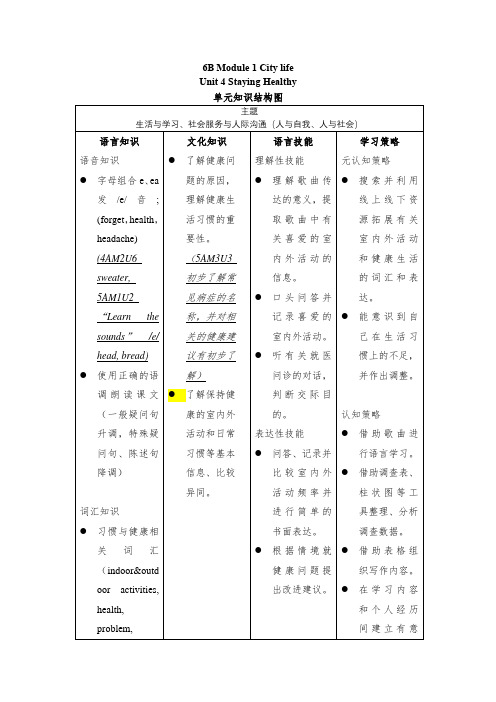
6B Module 1 City life Unit 4 Staying Healthy 单元知识结构图
本单元中,学生将围绕运动与健康这一主题,在阅读与听写活动中获取
室内外活动、健康问题和日常习惯等信息;了解就医问诊的方法,分析可能导致健康,做出改变,提升健康生活意识。
在歌曲学唱中,了解常见室内外活动,认识劳逸结合的健康生活方式;在谈论最喜爱的室内外活动中理解个人喜好的差异,了解调查图表的特点与作用;在Joe和kitty与医生进行有关健康问题的对话中,了解常见健康问题、成因及改善建议;在写作活动中,通过记录日常活动习惯,了解习惯与健康的关联,提升健康意识。
上海版牛津英语六年级上册单词表及课文翻译
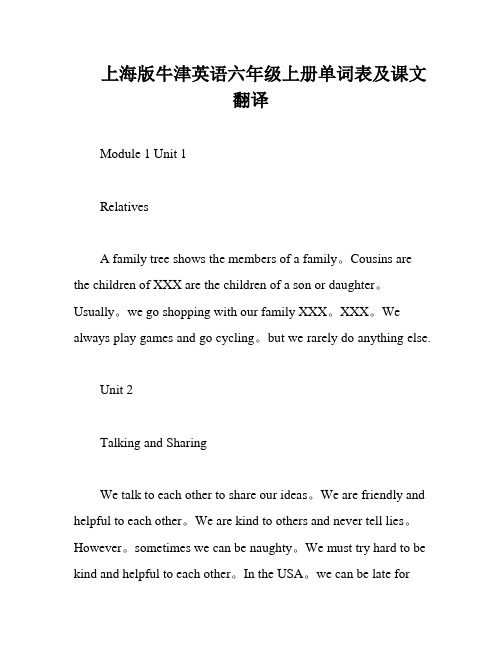
上海版牛津英语六年级上册单词表及课文翻译Module 1 Unit 1RelativesA family tree shows the members of a family。
Cousins are the children of XXX are the children of a son or daughter。
Usually。
we go shopping with our family XXX。
XXX。
We always play games and go cycling。
but we rarely do anything else.Unit 2Talking and SharingWe talk to each other to share our ideas。
We are friendly and helpful to each other。
We are kind to others and never tell lies。
However。
sometimes we can be naughty。
We must try hard to be kind and helpful to each other。
In the USA。
we can be late forappointments。
but we should always be kind and helpful。
We should be XXX.Unit 3XXXWe spend our weekends visiting places like the Summer Palace。
the Palace Museum。
Tiananmen Square。
the Great Wall。
and the Temple of Heaven。
We take photographs of these XXX。
We plan our trips and have many ideas about where to go next。
上海版牛津英语6A Unit 2拓展阅读和答案

An animal friendOne of my friends has a large German sheepdog. Its name is Jack. The dog is very clever. Every Sunday afternoon, my friend takes Jack for a walk in a park. Jack likes these long walks very much.One Sunday afternoon, a young man came to visit my friend. He stayed a long time, and he talked and talked. Soon it was time for my friend to take Jack for his walk, but the visitor didn’t leave. Jack became very worried about his walk in the park. He walked around the room several times and then sat down in front of the visitor and looked at him. But the visitor didn ’t notice it at all. Finally, Jack went out of the room and came back a few minutes later. He sat down again in front of the visitor, but this time he held the man’s hat in his mouth.German sheepdogs aren’t the only clever dogs. Another clever dog is a Seeing Eye dog. He helps blind people walk around the streets and do many other things. We call these dogs Seeing Eye dogs because they are the “eyes” of blind people and they help them to ‘s ee’.Pre-reading● Who is your best friend? ● Do you like animals? ● Do you have any pets?● Do you think animals can also be our best friends? Why?While-readingworried adj. 担心的visitor n.访问者several adj. 几个notice v. 注意A Vocabulary█Fill in the blanks with the words or expressions in the passage1 —You look _________. What’s wrong?—I lost my pet dog yesterday.2 Tony ___________ a poster on the wall.3 Three days _________, we got to Lijiang.4 Jane is the __________ student in the classroom.5 Mr Johnson _______ like the shirts in that shop _____________.B Comprehension█Tick True or FalseTrue False 1Jack takes a walk in a park with his owner every day.⏹⏹2Jack came to sit in front of the visitor in order to ask himleave at once.⏹⏹3The underlined word “sheepdog” is a kind of dog. Theycan be trained to control sheep.⏹⏹4Jack held the visi tor’s hat in his mouth to please him.⏹⏹5Seeing Eye dogs can help blind people walk here andthere.⏹⏹Post-readingA discussion●How do you like pets?●Have you got any pets at home? What are they?●How do you look after them?●What do the pets do every day?A friend in need?Pre-reading●Do you often ask your friends for help?●What do your friends often help you with?Fanny and Ethel work in the same office, and they are neighbours at home. Fanny is a careless girl, and she often loses things. Then she usually goes to Ethel to borrow more from her. Ethel is a kind girl, but she sometimes gets tired of lending things to her friend.One Saturday afternoon Fanny knocked at Ethel’s front door again. When Ethel came to open it, Fanny said to her, “Oh, hello, Ethel. Please lend me a bag. I’ve lost mine. I’m going to the shops, and I feel very foolish when I haven’t got anything in my hand in the street.”Ethel laughed and answered, “Well, Fanny, go down to the end of the garden. You will find a nice trolley there. Take that when you go down to the shops. Then you will have something in both of your hands.”Word box neighbour n. 邻居careless adj. 粗心的lose (lost, lost) v. 丢失get tired of 厌倦lend v. 借出foolish adj.愚蠢的trolley n. 手推车While-readingA Vocabulary█Find the opposite (反义词) of the following words in the passage1 clever ____________2 careful ______________3 find _____________4 borrow ______________5 cry _______________6 bring ________________B Comprehension█Choose the best answer.1 Fanny and Ethel _____________A) live together B) work in the same office C) are both careless2 Fanny liked borrowing things from __________ very much.A) the other people B) her neighbours C) Ethel3 Ethel ____________ to lend things to her friend.A) is always ready B) doesn’t like C) sometimes doesn’t want4 Fanny wanted to borrow ____________ from Ethel one Saturday afternoon.A) a bag B) a trolley C) a bag and a trolley5 Which of the following is NOT true?A) Ethel had no bags, so she lent Fanny the trolley.B) Fanny wanted to go shopping.C) Ethel didn’t want to lend a bag to Fanny.Situational dialogueYou want to borrow a book from your friend and tell him/her that you will give it back to him / her in a week.You can use these words and expressions:A Letter from Friend Pre-reading●Do you often write to your friend?●How often do you write to your friend?While-readinglife n. 生活 not … at all 根本不instead adv. 取而代之 go on a diet 节食A Vocabulary█ Fill in the blanks with the words and expressions in the word box 1 If you want to keep healthy, you must _________________. 2 The children in Shanghai live a happy _____________ now. 3 Sorry, I _____________ like the film ______________. 4 The skirts are in ____________ colours.5 They didn ’t go to park; they went shopping _________. B Comprehension █ Answer the questions1 How long has David been in America?___________________________________________________________________ 2 David has to do a lot of homework, doesn ’t he?___________________________________________________________________ 3 What is there at David ’s school?___________________________________________________________________ 4 Which does David like better, cola or water?___________________________________________________________________ 5 Why do David ’s parents want him to go on a diet?___________________________________________________________________Post-readingWrite a letter to your penfriend to tell him / her your school life in China.Unit 2 I have a good friendPassage 1A Vocabulary1 worried2 noticed3 later4 only5 doesn’t … at allB Comprehension1 F2 T3 T4 F5 TPassage 2A Vocabulary1 foolish2 careless3 lose4 lend5 laugh6 takeB Comprehension1 B2 C3 C4 A5 APassage 3A Vocabulary1 do more sports2 life3 don’t… at all4 different5 insteadB Comprehension1 Six months.2 No, he doesn’t.3 A lot of sports.4 Cola.5 To keep healthy.。
沪教牛津版小学英语六年级上册Module2《Unit 4 Our neighbours》教学课件PPT
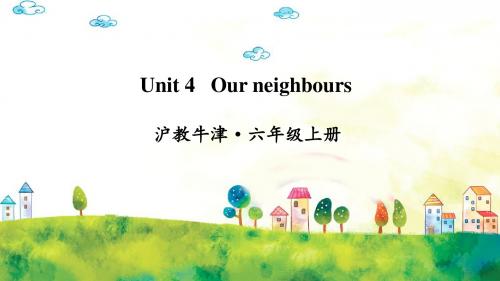
Think and write
Write about a neighbour.
___________is my neighbour. He/ She is _____________(age). He/ She is a/an _____________(job). I often ______________________with him/her. I sometimes _______________with him/her. Last______________, we_______________.
Ms Guo: Did you see them this morning?
Peter: No, I didn’t, but I played with Mike and Nancy last weekend.
Ms Guo: Who are your neighbours, Alice? Alice: The Wus are my neighbours. They have a son. His name is Sam.
一天晚上,猫头鹰又制造噪音。兔子们很生气。“请停止 在晚上制造噪音,”兔子们说,“我们不能睡觉。”但是 猫头鹰不听。
4
One of the rabbits had an idea. “Let’s dig a hole and sleep in it. It’s very quiet underground.”
She sometimes plays chess with her father.
辨析:sometime, some time 与 some times
sometime some time
单词/短语 单词
意思 改天;来日;某个时间
六年级上册单词、课文中译英(上海版牛津英语)

Module Family and relativesUnit1 My family tree我是艾丽丝。
这是我的家人和亲戚。
这是我的爷爷。
这是我的奶奶。
这是我的... 我是他们的儿子。
我是他们的女儿。
我们是他们的孙女。
我们是他们的孙子。
我们是他们的儿子。
艾丽丝,他们是你的家人和亲戚吗?是的,他们是。
这是我的爷爷。
这是我的奶奶。
这些是我的叔叔们,这是我的姑姑。
这些是我的表弟妹们。
我有两个叔叔。
你有几个叔叔?我有一个叔叔。
我只有一个姑姑。
你有几个姑姑?我也有一个姑姑。
艾丽丝,你和你的姑姑一起干什么?我通常和我的姑姑一起去购物。
你和她还干些别的什么事?我有时和她打羽毛球。
Unit2 I have a good friend我有一个朋友。
我有一个朋友。
她非常小。
我总是对她讲话。
但是她根本不说话。
我有一个朋友。
她喜欢玩耍。
我们去公园。
几乎每一天。
我有一个朋友。
她不会读和写。
她有时看电视。
晚上从不出去。
我喜欢我的朋友。
我的朋友喜欢我。
我的朋友是一只小狗。
她只有三岁。
艾丽丝和凯迪是好朋友。
她们喜欢在一起。
她们总是一起玩。
她们总是一起玩。
她们总是一起吃午饭。
总是分享她们的食物。
她们总是互相帮助。
她们总是一起步行去学校。
她们也总是帮助别人。
艾丽丝是我的好朋友。
她总是很友好而且乐于助人。
她学习努力。
她上学从不迟到。
她从不生气。
凯迪是我的好朋友。
她总是对别人很友好。
她总是和我一起分享她的食物。
她从不淘气。
她从不撒谎。
凯迪的表姐住在美国。
她叫温妮。
温妮第一次来参观花园城市。
凯迪:温妮,你已经去过海洋公园了吗?温妮:不,我还没去过海洋公园。
艾丽丝:你去过花园城市动物园吗?温妮:是的,我刚去过花园城市动物园。
凯迪:你去过北方城市花园吗?温妮:是的,我已经去过那儿。
艾丽丝:水上世界怎么样?你去过那儿吗?温妮:不,我还没去过那儿。
我星期六准备去那儿。
Unit3 Spending a day out together郭老师,你通常周末干什么?我常去王府井街购物。
牛津上海版英语六年级下册 Unit4单元测试 有答案,无听力
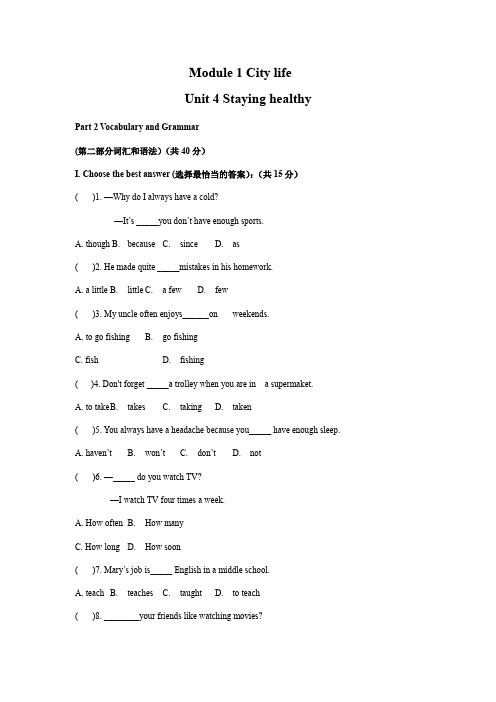
Module 1 City lifeUnit 4 Staying healthyPart 2 Vocabulary and Grammar(第二部分词汇和语法)(共40分)I. Choose the best answer (选择最怡当的答案):(共15分)()1. —Why do I always have a cold?—It’s _____you don’t have enough sports.A. thoughB.becauseC.sinceD.as()2. He made quite _____mistakes in his homework.A. a littleB.littleC. a fewD.few()3. My uncle often enjoys______on weekends.A. to go fishingB.go fishingC. fishD.fishing( )4. Don't forget _____a trolley when you are in a supermaket.A. to takeB.takesC.takingD.taken()5. You always have a headache because you_____ have enough sleep.A. haven’tB.won’tC.don’tD.not()6. —_____ do you watch TV?—I watch TV four times a week.A. How oftenB.How manyC. How longD.How soon()7. Mary’s job is_____ English in a middle school.A. teachB.teachesC.taughtD.to teach()8. ________your friends like watching movies?A. How much ofB. How muchC. How manyD. How many of()9. May I see the dentist now? I really have a terrible.A. headacheB. stomach acheC. toothacheD. sore throat( )l0. Jerry gets very fat because he often eats. sweets.A. too muchB. not manyC. too fewD. too many()11. It is important for students to practice_______ English every day.A. speakingB. sayingC. to playD.to say()12. Fatty Lenny doesn’t have exercise and he watches TV.A. many... manyB.m any... muchC. enough. . . too muchD.e nough... too many()13. We don’t have school this afternoon,but don’t to do your homework.A. needB. forgetC. likeD. want()14. — Do you enjoy reading or movies?A. No.B. Yes.C. Sorry.D. Neither.()15. — So, the square root of 144 is 12?A. All right.B. That’s right.C. Not bad.D. Okay.E. Complete the sentences with the given words in their proper forms(用括号内所给单词的适当形式完成下列句子):(共6分)1. Table tennis is usually played. (indoor)2. The Joker tried to find the Batman, (really)3.When he was 95,he became_______ so that he couldn’t remember a thing, (forget)4. It,s to eat 17 fried chicken wings at a time, (health)5. People always say that makes perfect, (practise)6. Whether he likes me became the of my heart, (puzzle)III. Rewrite the following sentences as required (根据所给要求,改写下列句子。
牛津英语上海版六年级第一学期 6A Unit 4教案(4课时,含教后感)
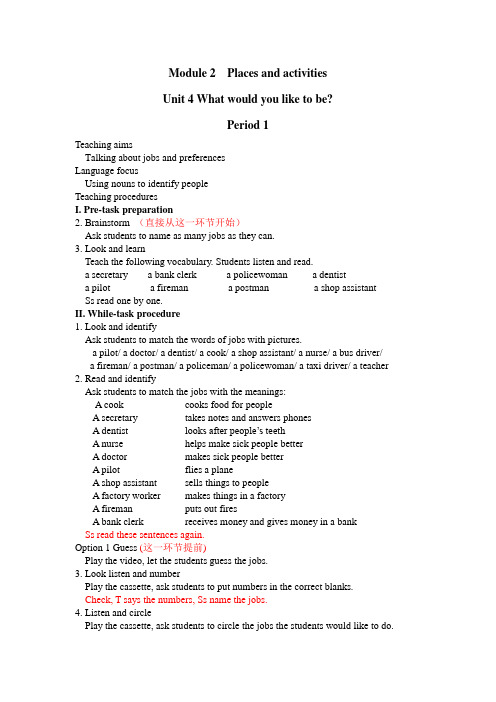
Module 2 Places and activitiesUnit 4 What would you like to be?Period 1Teaching aimsTalking about jobs and preferencesLanguage focusUsing nouns to identify peopleTeaching proceduresI. Pre-task preparation2. Brainstorm (直接从这一环节开始)Ask students to name as many jobs as they can.3. Look and learnTeach the following vocabulary. Students listen and read.a secretary a bank clerk a policewoman a dentista pilot a fireman a postman a shop assistantSs read one by one.II. While-task procedure1. Look and identifyAsk students to match the words of jobs with pictures.a pilot/ a doctor/ a dentist/ a cook/ a shop assistant/ a nurse/ a bus driver/a fireman/ a postman/ a policeman/ a policewoman/ a taxi driver/ a teacher2. Read and identifyAsk students to match the jobs with the meanings:A cook cooks food for peopleA secretary takes notes and answers phonesA dentist looks after people’s teethA nurse helps make sick people betterA doctor makes sick people betterA pilot flies a planeA shop assistant sells things to peopleA factory worker makes things in a factoryA fireman puts out firesA bank clerk receives money and gives money in a bankSs read these sentences again.Option 1 Guess (这一环节提前)Play the video, let the students guess the jobs.3. Look listen and numberPlay the cassette, ask students to put numbers in the correct blanks. Check, T says the numbers, Ss name the jobs.4. Listen and circlePlay the cassette, ask students to circle the jobs the students would like to do.(1. Read and answer 这一环节推后)Ask students to read and answer questions.Mark’s father visits Rose Garden School. He talks to Mark and his classmates...a. What job does Mark’s father do? He is a fireman.b. What does he usually do? He drives a fire-engine and puts out fires.c. Does he like his job? Yes, he does.d. Why does he like his job? Because he likes to help people and put out fires.2. Ask and answerAsk students to talk in pairs to find out their partner’s parents’ jo bs, like this:S1: What job does your father/mother do?S2: He/She is a(n) _____.S1: What does he/she usually do?S2: He/She …S1: Does he/she like his/her job?S2: Yes, he/she does./ No, he/she doesn’t.S1: Why?S2: Because he/she likes to …/Because he/she doesn’t like to…(2. Do a survey 不上)ConsolidationWorkbook 6A, page 211.Copy new words2.Read and recite the words3.Workbook P21教后记:有几个词的读音有些问题,a bank clerk、a pilot、a shop assistant,另外学生们对于有些职业做些什么工作不是很熟悉,尤其是用英语不太能表述,在下面的学习中要注意这方面的提点。
- 1、下载文档前请自行甄别文档内容的完整性,平台不提供额外的编辑、内容补充、找答案等附加服务。
- 2、"仅部分预览"的文档,不可在线预览部分如存在完整性等问题,可反馈申请退款(可完整预览的文档不适用该条件!)。
- 3、如文档侵犯您的权益,请联系客服反馈,我们会尽快为您处理(人工客服工作时间:9:00-18:30)。
Module 2 Unit4(第一部分听力)一.Listen and choose the right pictures(根据你听到的内容,选出相应的图片)1.________2.________3.________4.________5.________6.________二.Listen to the dialogues and choose the best answer to the question you hear (根据你听到的对话和问题,选出最恰当的答案)( )6.A.In the library. B. In the post office. C. In the shop. D. In the office.( )7.A.10. B.12. C.14. D.16.( )8.A.Jim. B. Jim’s mother. C. Jim’s teacher. D. Jim’s friend.( )9.A.Once. B. Twice. C. Three times. D. Four times. ( )10.A.In a TV station. B. In a bank. C. In a factory. D.In a university.( )11.A.Do homework. B. Play the piano. C. Play tennis. D. Play chess. ( )12.A.To say thanks. B. To say goodbye.C. To work here.D. To enjoy himself.( )13.A.Mum and son. B. Customer and shop assistant.C. Teacher and student.D. Father and mother.in. Listen to the passage and tell whether the following statements are true or false (断下列句子是否符合你听到的短文内容,符合的用“T”表示,不符合的用“F”表示)( )14. The summer holidays begin in June.( )15. The summer holidays end in August.( )16. Most children's favorite holiday is the summer holidays.( )17. Children like to go to the seaside for holiday because they can swim, camp and travel withtheir parents.( )18. Children who live far away from the sea have no chance to spend their holiday at the seaside.( )19. Children have a lot of fun when they spend their holiday at the seaside.IV. Listen to the dialogue and complete the following sentences (听短文,完成下列内容,每空格限填一词)20.It will take them _______an hour to get to Blue Sky Water World21.There is a big swimming _______in the water world.22.There is a small _______in the Sunshine Park.23.The woman doesn’t like seeing _______in cages.24.They don’t eat at _______because they are always so expensive.Part Two Vocabulary and Grammar(第二部分词汇和语法)一. Choose the best answer (选择最恰当的答案)( )25. Which of the following underlined parts is different in pronunciation from the others?A. planB. binC. bankD. interview( )26. Can I have _______look at the photo of your Net-pal?A. aB. anC. theD./( )27. Let’s play tab le tennis _______Tuesday morning, shall we?A. onB. inC. atD./( )28. Christine, can you introduce _______to Alice? I want to meet her.A. himB. hisC. meD. my( )29. My uncle has gone to Singapore. He will be _______in a week.A. outB. offC. backD. away( )30. — How often does Bob play tennis?A. Once a month.B. For a month.C. A month ago.D. A month later.( )31. I can _______ be a doctor. I am not a very patient person.A. seldomB. everC. neverD. always( )32.—Michael likes flying around the world.—I think being a _______ is just right for him.A. policemanB. pilotC. postmanD. doctor( )33. I am going to find some food for the children. They _______ anything yet.A. don’t eatB. won’t eatC. haven’t eatenD. didn’t eat( )34. Don’t use water to _______ kitchen fires. Use soda or salt instead.A. put onB. put offC. put outD. put down( )35. —Would you like to be pilot?—_______A. Yes, I wouldn’t.B. Yes, I do.C. Yes, I like.D. Yes, I would.( )36. — Simon, ______?—He is a policeman.A. where is your fatherB. how is your fatherC. what does your father doD. who is your father( )37. —Would you like to go to the concert with us?—I’d love to, ______ I am afraid I have no time.A. soB. orC. andD. but( )38.—Would you like to go out for a barbecue?—Sure, the TV programs are too _______A. surprisingB. excitingC. interestingD. boring( )39.—Shall we go to the aquarium (水族馆)this weekend?—_______A. You are right.B. Take it easy.C. Sounds great.D. Have fun.二.Complete the following passage with the words in the box. Each can only be used once (将下列单词填入空格。
每空格限填一词,每词只能填一次)A. fastB. slowlyC. tellD. protectE. foodTrees are one of the oldest citizens (公民)of our earth. Just like us, trees change a lot when they grow. At one to three years old, young trees learn how to 40 themselves. For example, many trees grow thorns (刺)to 41 animals not to go near. Most young trees have large, deep green leaves so that they can catch enough sunlight and change it into their 42 and energy.When trees are 4 years old, they begin to grow very 43 and become strong enough to face challenges (挑战)in life.A. likeB. goodC. poorD. realE. importantAt the age of 15, trees become young adults. They grow slowly and begin to produce flowers and fruit.It is not until the trees are 20 to 25 years old that they become 44 adults. The trees reach their largest sizes. Adult trees give us many things such as oxygen (氧气)and natural beauty. If we give them 45 care , they will go on to live healthily for many years.As time goes on, trees begin to grow older and older and even die. At this time, they still have their 46 place in nature. In many ways, the life of trees is 47 our own life experience. Enjoy every minute of the life of the trees and take care of them!40._______ 41. _______ 42. _______ 43. _______44. _______ 45. _______ 46. _______ 47. _______三.Complete the sentences with the given words in their proper forms (用括号中所给单词的适当形式完成下列句子。
